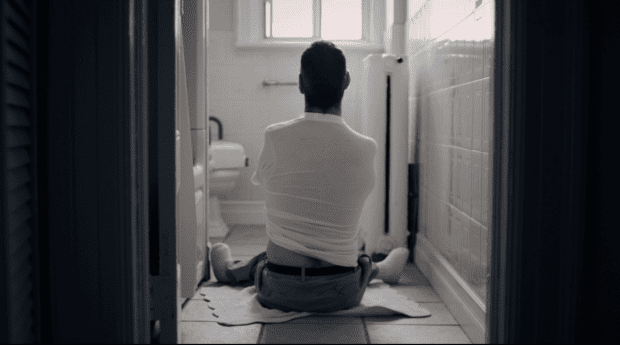“I thought he was so punk rock.” That was Martin Edralin’s impression after his first encounter with Ken Harrower. The Toronto-based director of Hole met his would-be star while shooting a public service announcement about housing and accessibility. Harrower was acting in the piece and turned up to the set proudly sporting a rainbow flag on his wheelchair. Seeing someone living with a physical disability and proudly proclaiming their sexuality caught Edralin’s imagination.
Originally from Manitoba, Harrower has arthrogryposis multiplex congenita , a condition resulting in severely contracted joints. Abandoned by his biological parents as an infant, he grew up in series of foster homes before leaving for Ontario after he turned 18. Now in his early 50s, Harrower works as an advocate for people with disabilities in addition to pursuing a career as an actor.
The road from chance meeting to full-fledged collaboration was hardly direct. Though he was curious about exploring a character living with a disability, Edralin didn’t write the piece specifically for Harrower. He penned then tossed multiple scripts until he finally landed on Hole, which examines sexuality through that lens. Even then, he didn’t immediately hand Harrower the part.
“I was originally writing with the idea of the character being much younger,” Edralin says. “I wanted to audition Ken, but wasn’t honestly convinced he could play the role. We had a callback with him, talked about it, and decided to go for it. But even when we first started shooting we weren’t sure it would work out.”
Ultimately, the gamble paid off. Since it premiered a year ago, Hole has played at nearly 70 festivals worldwide. Most recently, it snagged the prize for best international short at the Tel Aviv LGBT International Film Festival — offers to screen it continue to pour in. Shot in a simple, documentary-like style, the piece follows Ken’s character Billy as he seeks sexual satisfaction and human connection.
“I went back and forth about whether the character in the film was actually gay or not,” Edralin says. “In the end I felt like he’s probably not gay, but it also doesn’t really matter. Ultimately, I wanted to tell a story about a character with a difficult life that struggles to fit in with other people, but wants to participate fully and have normal life experiences.”
On whether the film has changed people’s perspectives on disability and sexuality, Edralin seems more subdued.
“I think it’s opened people’s eyes,” he says. “But we often see things that make us empathize with other people and then fail to act. I think it might shift some people’s perspectives. Whether that will lead to some kind of positive action I have no idea.”


 Why you can trust Xtra
Why you can trust Xtra


